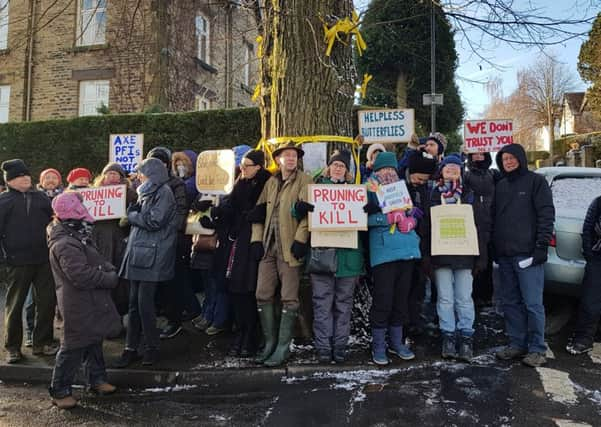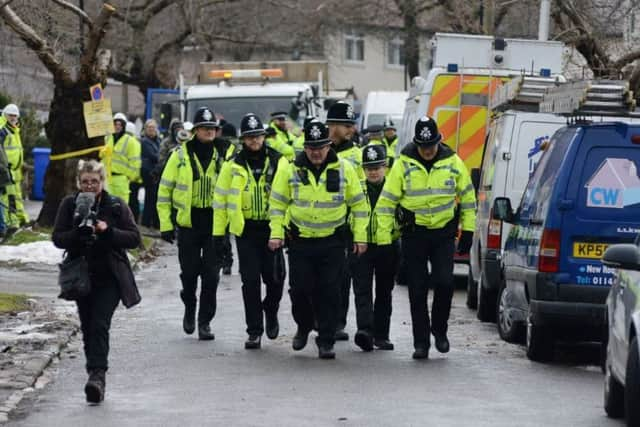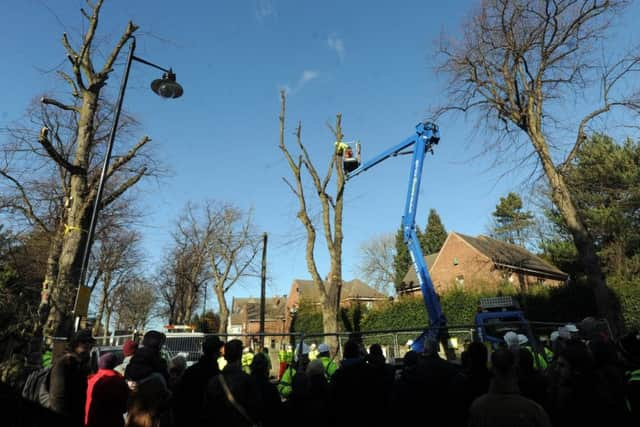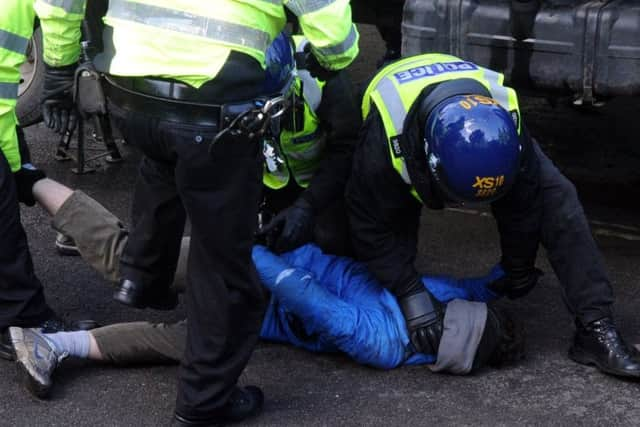The Butterfly Effect: How false allegations about peaceful protest put Sheffield tree policing tactics back in spotlight


A butterfly flaps its wings and one year later, a review exonerating controversial police tactics in the Sheffield tree-felling saga comes under major scrutiny.
This is the story of how ‘lurid’ allegations that anti tree-felling campaigners were attempting to seriously injure council contractors by cutting safety ropes, studding trees with nails and glass and using oil which could cause chainsaws to slip came to be prominently highlighted in a public report – despite there being no proof the claims were actually true.
And it all begins with an endangered butterfly.


****
Advertisement
Hide AdAdvertisement
Hide Ad“It was all good-natured,” Anne Barr recalls of the chilly day in February 2018 when she was part of around 40 anti tree-felling campaigners in Sheffield gathered around the bottom of an elm tree home to a colony of rare white-letter hairstreak butterflies. “Some singing went on but it was mostly standing around the tree in a group.”
The tree, on Chelsea Road in the Nether Edge area of the city, had become one of the symbols of the long-running battle over street tree felling as part of a £2bn Sheffield Council highways contract with Amey and the protesters had got into position to prevent contractors carrying out pruning work on it ahead of its planned felling after the removal of the colony.


“When Amey turned up, they could see there was no way they could gain access to the tree,” explains Barr, a member of the Sheffield Tree Action Groups (STAG) organisation. She says that after a brief discussion in which an Amey director was told “very politely” the group weren’t going to allow any work to take place that day, the contractors left and the crowd dispersed. “There was no unpleasantness of any sort,” she says.
Advertisement
Hide AdAdvertisement
Hide AdHer account is backed up by a Press Association report published the same day, which stated “after a short stand-off and a conversation between the protesters and an executive of the contractors, Amey, the workers left.”
The relatively-uncontentious protest had come just weeks after several heated confrontations between campaigners and private security guards hired by Amey on Meersbrook Park Road that resulted in complaints of assault being made by both sides. And it was soon overshadowed by a greatly-enhanced police presence at daily felling operations in late February and March that saw multiple arrests and national condemnation of the council and police’s approach to the issue before the work was put on hold.


But the events of the day were unexpectedly brought back into focus several months later when serious allegations about the behaviour of protesters were made public in an official report by an ‘Advisory Panel on Policing Protests’ to South Yorkshire Police and Crime Commissioner Alan Billings which was published in June.
Advertisement
Hide AdAdvertisement
Hide AdThe review had been ordered by Dr Billings in response to criticism of South Yorkshire Police sending dozens of officers on a daily basis to support council tree-felling work in what was known as Operation Quito, with the panel’s work chaired by distinguished solicitor Andrew Lockley, a former head of public law at Irwin Mitchell.
The force had been subject to particular scrutiny after sending around 30 officers to a felling operation that was observed by the panel on March 8 – while on the same afternoon a father-of-three was stabbed to death on a street in a different part of Sheffield. But the panel’s review found the police’s tactical plan to be “proportionate” – and claimed that in addition to the Meersbook Park Road clashes in January, part of the context for the launch of the operation on February 26 had been an incident earlier in the month.
It said: “On 21 February 2018, SCC [Sheffield City Council] announced that work had to be abandoned at Nether Edge Sheffield, S7. Its statement said that protesters appeared to be using dangerous tactics such as pulling and cutting safety ropes, studding trees with nails and glass and using oil which could cause chainsaws to slip.”
But it can now be reported that statement was incorrect for two reasons; firstly a mix-up over the date when work was called off and secondly – and more importantly – about what the council press release had actually said. The authority’s announcement said work on the Chelsea Road elm “was aborted last week due to protester action” and made no mention of any of the specific allegations outlined in the panel’s subsequent report.
Advertisement
Hide AdAdvertisement
Hide AdBarr says the allegations came as a shock. “Apart from anything else, why would we damage a tree that we love so much with nails and glass? It makes no sense whatsoever.”
The allegations in the panel’s review sparked a series of Freedom of Information requests from tree campaigners about where the claims had originated from. In October, the panel agreed to amend its report to say the claims had come from South Yorkshire Police’s communications plan for Operation Quito after a later council press release on February 23 said some campaigners were “adopting increasingly violent tactics”.
The revised report now reads: “On 21 February 2018, SCC announced that work had to be abandoned the previous week, at Nether Edge, Sheffield S7. The statement from SCC on 23 February said that protesters appeared to be using dangerous tactics. These tactics were expanded upon in the Force’s Communications Plan, which was supplied as part of the review process. This explained that the ‘dangerous tactics’ involved pulling and cutting safety ropes, studding trees with nails and glass and using oil which could cause chainsaws to slip.”
A partially-redacted version of the police communications plan, now made public under FoI, reads: “They have pulled on and cut safety ropes of Amey workers, olive oil has been sprayed on trees (this could cause a chainsaw to slip), and one tree was discovered to have been studded with nails and glass.”
Advertisement
Hide AdAdvertisement
Hide AdHowever, The Yorkshire Post can now reveal the allegations were never investigated by police after an FoI response said the matter “was raised by the contractors in [an] initial risk assessment meeting”. That same police FoI, published in August, also said the matters had been reported before late January 2018 and investigated as a potential public order offence but no action was taken.
However, South Yorkshire Police has now confirmed to The Yorkshire Post that the claims were included in its communications plan as “information and intelligence” – but never investigated as a crime because there was no evidence to back them up. “All reports of crime, which were supported by evidence, were investigated by South Yorkshire Police,” a force statement said. “Any other information and intelligence was treated as such, and, as with any operation, was used proportionately with all other information, to inform relevant elements of the planning and decision-making process.”
Amey refused to answer questions about whether any of its workers or sub-contractors had ever raised these allegations with the company and if so, when and where the incidents were said to have occurred as well as if they were ever reported to the police at the time. The company also refused to answer whether it had raised these allegations with the police in the planning process for Operation Quito. The company instead provided a statement, issued through Sheffield Council’s press office, about recent changes to the way felling work is assessed.
“Last month, following extensive talks, we were pleased to arrive at a compromise with SCC and members of STAG,” it said. “All responsible parties are now focused on working together to provide the best possible outcome for the people of Sheffield.”
Advertisement
Hide AdAdvertisement
Hide AdThe newly-released FoI documents also reveal how South Yorkshire Police Assistant Chief Constable David Hartley had wanted the allegations to be removed from the panel’s report entirely once concerns about their inclusion came to light – but the request was rejected by panel chair Andrew Lockley over fears doing so would damage the panel’s credibility. An email from a press officer in the crime commissioner’s office to Mr Lockley on October 12 read: “I have spoken with ACC Hartley about the query and the conclusion that we came to was that the sentence about the tactics should be removed from the report.”
But Mr Lockley rejected the idea and say it should instead be made clear that the allegations had originated from the police rather than the council. “It won’t surprise you to know that I can’t accept this,” he said. “It appears from what has now been drafted that the panel invented the lurid examples of the dangerous tactics, rather than simply made a mistake as to the source. That will undermine the credibility of the panel. I would prefer to give the explanation on which we agreed earlier in the week.”
It was subsequently agreed the report would be amended to say that after the council statement of February 23 had referred to “dangerous tactics”, this was expanded upon in the force’s communication plan which the panel had looked at as part of the review.
A statement from Dr Billings’s office confirmed that the panel had not checked with the police if there had actually been an investigation into the allegations and what the outcome had been prior to including the claims in its report.
Advertisement
Hide AdAdvertisement
Hide AdIt said that in addition to the information being in the police communications plan, “it was also mentioned at the briefings around the operation that were attended by panel members” which had been attended “by the police and other agencies”.
“During the briefings prior to the observation the information was presented as intelligence in the ongoing operation,” it added. “In the discussions following the publication of the report, raised by the FoI request, the panel were made aware that no further action had been taken and they were satisfied that the report needed to be amended.”
The statement also explained how the original mistake of attributing the allegations to the council had come about. It said: “The council press release [of February 23] referred to ‘some members of the campaign group are now adopting increasingly violent tactics’. In the initial correspondence between the Office of the Police and Crime Commissioner and the Advisory Panel on Policing Protests to ascertain the source of the information the press release was referenced. Following further discussion with panel members it was recognised that the panel had quoted this reference from the communications plan, not the press release, and it was amended.”
But the statement stopped short of saying the panel regretted reporting the allegations. “In the light of its further investigation, the panel was satisfied that the report needed to be amended.”
Advertisement
Hide AdAdvertisement
Hide AdJustin Buxton, one of the campaigners involved with the FoIs that revealed the new information, says: “Sometimes protests did get a bit heated and there might have been swearing but nothing like this. There has been a drip-drip-drip of outrageous allegations. When this came out, it was time to draw the line.”
****
The Chelsea Road elm is still standing one year on, following negotiations back in February 2018 after the initial stand-off leading to a negotiated agreement for pruning work to be overseen by an independent expert and the relocation of butterfly eggs assisted by the Butterfly Conservation Trust and Sheffield and Rotherham Wildlife Trust.
Anne Barr says it was the first successful example of negotiation in the Sheffield tree dispute with the new approach to felling work – designed to reduce felling numbers through work such as repairing kerbs – following a similar course.
“Now many trees are being saved on a daily basis by Amey applying simple and effective solutions to save trees previously doomed for felling.
“We are all very pleased that many trees are being saved yet angry that thousands have gone when these solutions could and should have been applied to those too.”